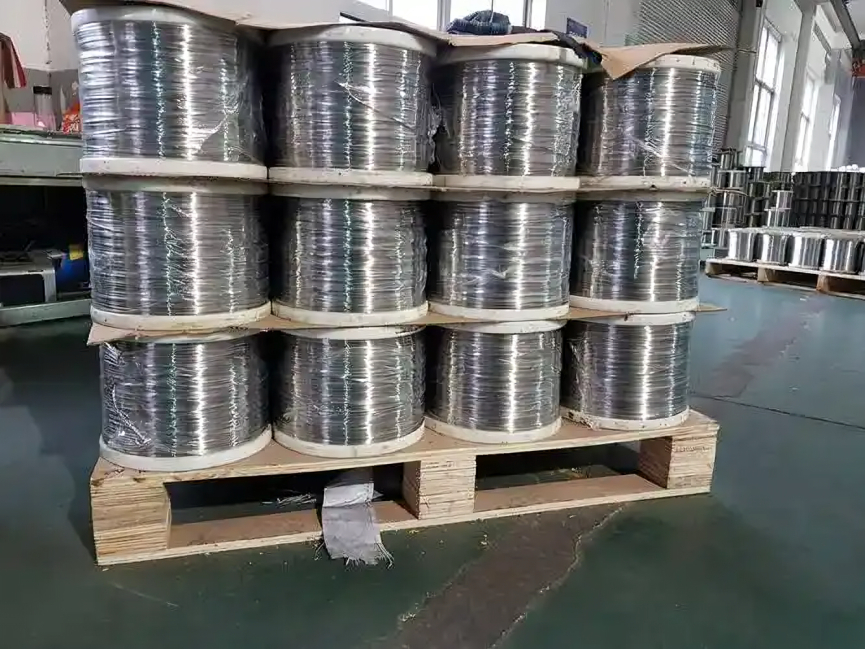
Cr30Ni70 Electrical Resistance Alloy
Cr30Ni70 is a high-performance electrical resistance alloy with 30% chromium and 70% nickel, known for excellent stability and durability at high temperatures. It is widely used in heating elements, industrial furnaces, and other applications requiring reliable resistivity and corrosion resistance in extreme environments.

Standard Dimensions of Cr30Ni70 Electrical Resistance Alloy in Various Forms
| Form | Thickness | Width | Diameter | Length |
|---|---|---|---|---|
| Cr30Ni70 Electrical Resistance Alloy Wire | – | – | 0.1 mm – 10 mm | Custom lengths |
| Cr30Ni70 Electrical Resistance Alloy Strip | 0.05 mm – 2.5 mm | 5 mm – 200 mm | – | Custom lengths |
| Cr30Ni70 Electrical Resistance Alloy Sheet | 0.5 mm – 3 mm | Up to 1000 mm | – | Custom sizes available |
| Cr30Ni70 Electrical Resistance Alloy Rod | – | – | 3 mm – 100 mm | Custom lengths |
| Cr30Ni70 Electrical Resistance Alloy Ribbon | 0.02 mm – 0.1 mm | 0.5 mm – 5 mm | – | Custom lengths |
Chemical composition of Cr30Ni70 Electrical Resistance Alloy
| Element | Composition (%) |
|---|---|
| Chromium (Cr) | 28.0 – 31.0 |
| Nickel (Ni) | 68.0 – 71.0 |
| Manganese (Mn) | ≤ 1.0 |
| Silicon (Si) | ≤ 0.5 |
| Carbon (C) | ≤ 0.1 |
| Iron (Fe) | ≤ 1.0 |
Corresponding and Similar Grades to Cr30Ni70 Electrical Resistance Alloy
| Standard / Manufacturer | Grade | Country / Region |
|---|---|---|
| ASTM | UNS N06003 | USA |
| DIN | 2.4869 | Germany |
| JIS | NCF30-20 | Japan |
| GB | GH30Ni70 | China |
| VDM Metals | VDM® Alloy 600 | Global |
| Kanthal | Nikrothal® 70 | Sweden |
| Isabellenhütte | Isa-Ohm® 471 | Germany |

Our company maintains strong cooperative relationships with many well-known domestic enterprises, such as Taigang (TISCO) and JISCO. We have advanced technology and production equipment, and our metal products have passed international quality standard certifications.(SGS ISO 9001)

We offer a wide variety of alloy products to meet your diverse needs. You can choose from different shapes and grades of alloys. With a large inventory of metal products, we can quickly fulfill your order requirements.

Huaxiao Alloy is a trusted alloy metel supplier. Our team provides full support from pre-sales to after-sales services. Our 24/7 customer service ensures that your needs are always taken care of. We are here to solve any issues related to your alloy material requirements at any time!
Physical Properties of Cr30Ni70 Electrical Resistance Alloy
| Property | Value | Units |
|---|---|---|
| Density | 8.2 | g/cm³ |
| Melting Point | 1380 – 1400 | °C |
| Electrical Resistivity | 1.18 | µΩ·m |
| Thermal Conductivity | 13 | W/m·K |
| Coefficient of Thermal Expansion | 16 | µm/m·°C (20–1000°C) |
| Specific Heat Capacity | 460 | J/kg·K |
| Maximum Operating Temperature | 1200 | °C |
Mechanical Properties of Cr30Ni70 Electrical Resistance Alloy
| Property | Value | Units |
|---|---|---|
| Tensile Strength | 650 – 800 | MPa |
| Yield Strength | 300 | MPa |
| Elongation | 25 – 35 | % |
| Hardness (Rockwell B) | 85 – 95 | HRB |
| Modulus of Elasticity | 200 | GPa |
| Creep Strength (at 1000°C) | 15 | MPa |
Applications of Cr30Ni70 Electrical Resistance Alloy
1. Electrical Heating Elements
Cr30Ni70 is extensively used in high-temperature electrical heating elements for both industrial and household applications. Unlike some similar alloys, Cr30Ni70 offers exceptional long-term stability and resistance to oxidation, ensuring consistent performance over prolonged periods. This makes it ideal for use in appliances such as ovens, toasters, and industrial heating systems, where reliable, high-resistance materials are essential.
2. Industrial Furnaces
The alloy is particularly suited for heating elements in industrial furnaces, especially in applications requiring durability at temperatures up to 1200°C. The high nickel content enhances thermal stability, preventing deformation and maintaining consistent resistance under continuous high-temperature conditions. In comparison to lower-nickel alloys, Cr30Ni70 is less susceptible to oxidation and embrittlement, making it ideal for intense heating applications.
3. Precision Resistors and Potentiometers
Cr30Ni70 is valued in the manufacture of precision resistors and potentiometers, where stable resistance is critical. Its high electrical resistivity and minimal drift in resistance over a wide temperature range make it an excellent choice for applications demanding high accuracy. Cr30Ni70 stands out from other grades by maintaining consistent resistance values even with frequent temperature changes.
4. Aerospace Applications
In aerospace engineering, Cr30Ni70 is used in components exposed to extreme temperatures and oxidative environments, such as turbine blades and exhaust systems. Its ability to retain mechanical integrity and resist scaling at high temperatures makes it superior to similar alloys with lower chromium or nickel content, providing enhanced reliability for critical aerospace components.
5. Automotive Industry
The alloy finds use in automotive applications where high resistance to heat and oxidation is required, such as in exhaust systems and catalytic converters. Cr30Ni70’s robust high-temperature performance differentiates it from other resistance alloys, ensuring durability and stability in high-stress environments that are typical in automotive systems.
6. Petrochemical Processing Equipment
Cr30Ni70’s excellent oxidation and corrosion resistance make it well-suited for petrochemical applications, especially in heat exchangers, reactors, and other equipment exposed to corrosive gases and high temperatures. This alloy performs better than other grades by providing extended resistance to chemical corrosion and thermal degradation, making it reliable for use in aggressive environments.
7. Laboratory and Scientific Equipment
In laboratory and scientific applications, Cr30Ni70 is used in high-temperature instruments and equipment where stable resistance under heat is crucial, such as in thermocouples and laboratory heaters. Its stability at high temperatures and consistent resistivity offer greater precision and reliability than other resistance alloys, making it essential for sensitive applications that require accuracy.
Key Advantages of Cr30Ni70 Over Similar Alloys
Superior High-Temperature Stability: Cr30Ni70 retains structural integrity and resistivity at temperatures up to 1200°C, making it more reliable than lower-nickel alloys for continuous high-temperature applications.
Enhanced Oxidation Resistance: The high chromium content in Cr30Ni70 provides excellent resistance to oxidation, leading to longer life in oxidative environments compared to similar alloys with lower chromium levels.
Consistent Electrical Resistivity: Unlike some resistance alloys, Cr30Ni70 provides stable resistivity with minimal drift across a range of temperatures, which is essential for precision applications like potentiometers and resistors.
Corrosion and Scaling Resistance: In harsh industrial environments, Cr30Ni70 offers better resistance to corrosion and scaling than many comparable alloys, resulting in reduced maintenance and improved longevity.
Comparison of Cr30Ni70 Electrical Resistance Alloy to Other Alloys
1. Comparison with FeCrAl Alloys
FeCrAl alloys, known for their high resistance to oxidation and exceptional strength at elevated temperatures, are widely used in industrial heating applications. However, Cr30Ni70 offers several key advantages in comparison:
Thermal Stability: While FeCrAl alloys perform well at extremely high temperatures (up to 1400°C), they can become brittle over time, especially during frequent heating and cooling cycles. Cr30Ni70, although operating at a slightly lower maximum temperature (up to 1200°C), exhibits excellent ductility and remains stable under cyclical thermal stress, making it preferable for applications where frequent temperature changes occur.
Oxidation Resistance: Both Cr30Ni70 and FeCrAl alloys demonstrate high oxidation resistance, but Cr30Ni70 has an advantage in environments with complex gases or where rapid temperature changes occur. The alloy’s chromium and nickel composition provides better resistance to oxidation in both high-temperature and oxidative atmospheres.
Electrical Resistivity: Cr30Ni70 typically has a higher resistivity compared to FeCrAl, which allows it to achieve the desired heating effect with a lower mass of material. This higher resistivity is particularly valuable for precision heating applications, where uniform heat distribution and stability are critical.
Brittleness: FeCrAl alloys tend to become brittle at high temperatures, especially under high-stress conditions, while Cr30Ni70 retains its ductility. This property makes Cr30Ni70 more suitable for applications requiring flexibility, such as in heating elements that may need to be coiled or shaped.
2. Comparison with NiCr Alloys (e.g., NiCr80/20)
NiCr alloys, such as NiCr80/20, are another popular choice for electrical resistance applications, especially in heating elements. However, Cr30Ni70 differs from these alloys in several important aspects:
Resistivity and Heating Efficiency: Both NiCr80/20 and Cr30Ni70 have high electrical resistivity, but Cr30Ni70 tends to provide slightly more stable resistivity over a wide temperature range. This stability makes it an ideal choice for applications where precise control of temperature and resistance is required.
High-Temperature Strength: NiCr80/20 offers good high-temperature strength, but Cr30Ni70’s balance of chromium and nickel composition enhances its ability to withstand oxidation and retain mechanical properties at high temperatures, especially under sustained use.
Corrosion Resistance: While both NiCr80/20 and Cr30Ni70 are highly corrosion-resistant, Cr30Ni70’s specific composition gives it an edge in environments with a mix of corrosive gases or in applications with exposure to varying oxidative conditions. This makes Cr30Ni70 particularly advantageous in environments such as industrial furnaces or petrochemical processing equipment where corrosion resistance is critical.
Thermal Cycling Durability: Cr30Ni70 performs exceptionally well under thermal cycling conditions, which can be a weak point for some NiCr alloys. The alloy’s ductility and resistance to oxidation make it suitable for applications involving frequent start-stop cycles, such as precision heating equipment.
3. Comparison with Copper-Nickel (CuNi) Alloys
Copper-Nickel alloys, like CuNi44, are used in specific resistance applications due to their high resistivity and relatively low temperature coefficient of resistance. However, Cr30Ni70 has advantages over CuNi alloys in high-temperature environments:
Temperature Limitations: CuNi alloys typically operate effectively up to around 400-500°C, beyond which they lose stability and resistance properties. Cr30Ni70, by contrast, can withstand temperatures up to 1200°C, making it far more suitable for high-temperature applications like industrial heating elements and furnace components.
Oxidation and Scaling Resistance: CuNi alloys are prone to oxidation and scaling at elevated temperatures, whereas Cr30Ni70’s high chromium content ensures excellent oxidation resistance. This characteristic is essential for applications requiring prolonged high-temperature operation, such as in laboratory and scientific equipment.
Mechanical Strength: Cr30Ni70 is mechanically stronger and more durable at elevated temperatures compared to CuNi alloys. In high-stress or high-heat environments, Cr30Ni70 is less likely to deform, which makes it preferable for applications requiring structural stability under load.
4. Comparison with Iron-Based Alloys
Iron-based alloys with moderate chromium content are often used in lower-cost applications. While cost-effective, they do not match the high-temperature stability or resistance properties of Cr30Ni70.
Performance at Elevated Temperatures: Iron-based alloys generally lose strength and resistivity stability at temperatures above 600°C, whereas Cr30Ni70 maintains performance up to 1200°C. This makes Cr30Ni70 far superior for applications that demand consistent electrical resistance and mechanical integrity at high temperatures.
Corrosion and Oxidation Resistance: While some iron-based alloys are treated to improve corrosion resistance, they cannot match Cr30Ni70’s robustness against oxidation and corrosion in high-temperature and oxidative atmospheres. This makes Cr30Ni70 more suitable for use in harsh industrial environments where standard iron alloys would degrade quickly.



